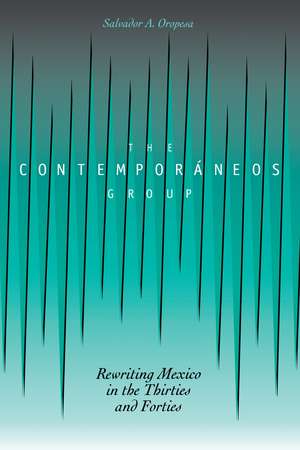The Contemporáneos Group: Rewriting Mexico in the Thirties and Forties
Autor Salvador A. Oropesaen Limba Engleză Paperback – mai 2003
Oropesa discusses Novo and Villaurrutia in relation to neo-baroque literature and satiric poetry, showing how these inherently subversive genres provided the means of expressing difference and otherness that they needed as gay men. He explores the theatrical works of Lazo, Villaurrutia's partner, who offered new representations of the closet and of Mexican history from an emerging middle-class viewpoint. Oropesa also looks at women's participation in the Contemporáneos through Guadalupe Marín, the sometime wife of Diego Rivera and Jorge Cuesta, whose novels present women's struggles to have a view and a voice of their own. He concludes the book with Novo's self-transformation from intellectual into celebrity, which fulfilled the Contemporáneos' desire to merge high and popular culture and create a space where those on the margins could move to the center.
Preț: 166.47 lei
Nou
Puncte Express: 250
Preț estimativ în valută:
31.86€ • 33.07$ • 26.56£
31.86€ • 33.07$ • 26.56£
Carte tipărită la comandă
Livrare economică 22 martie-05 aprilie
Preluare comenzi: 021 569.72.76
Specificații
ISBN-13: 9780292717152
ISBN-10: 0292717156
Pagini: 191
Dimensiuni: 152 x 229 x 14 mm
Greutate: 0.45 kg
Editura: University of Texas Press
Colecția University of Texas Press
ISBN-10: 0292717156
Pagini: 191
Dimensiuni: 152 x 229 x 14 mm
Greutate: 0.45 kg
Editura: University of Texas Press
Colecția University of Texas Press
Notă biografică
Salvador A. Oropesa is Professor of Spanish at Clemson University.
Cuprins
- Acknowledgments
- Introduction
- 1. Neo-Baroque
- 2. Gay and Baroque Literatures
- 3. Satiric Poetry
- 4. Agustín Lazo (1896-1971): Xavier Villaurrutia's Shadow
- 5. Guadalupe Marín: The Madwoman in the Murals
- 6. Gossip, Power, and the Culture of Celebrity
- Notes
- Bibliography
- Index
Descriere
Salvador Oropesa offers original readings of the works of five Contemporáneos--Salvador Novo, Xavier Villaurrutia, Agustín Lazo, Guadalupe Marín, and Jorge Cuesta--and their efforts to create a Mexican literature that was international, attuned to the rea















